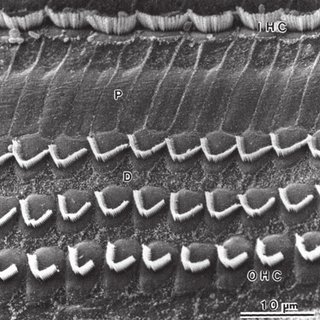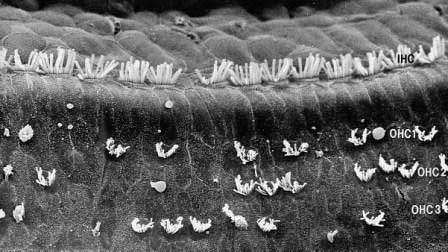60 Second Read
We are seeing an increase in people with problem tinnitus post COVID-19 infections. In 2019 over 1.6 million Canadians reported significant tinnitus symptoms, that is hearing sounds such as a ringing in their ears with no external sounds present, that interfered with sleep or daily tasks. Hearing loss due to infections and subsequent tinnitus have long been linked, but the link between COVID and tinnitus was only recently confirmed. An article Journal Article Nature reported that hair cells and Schwann cells of the inner ear can be infected and damaged by COVID-19. Finally, a study in Frontiers in Science found that COVID-19 symptoms exacerbated tinnitus in 40% of the people in their study. While a cure for tinnitus is not yet available, tinnitus is treatable.
If you have hearing loss post infection, see a doctor or book a hearing test and evaluation soon as possible.

Polo Park Hearing Centre has two Board Certified Hearing Instrument Specialists on staff that hold a Tinnitus Care Provider Certificate from the International Hearing Society.
Post COVID Tinnitus
We are often asked about a link between COVID-19 and tinnitus with or without hearing loss. While we are seeing many people with tinnitus post COVID-19, we decided to do some reading. There are numerous articles and research literature on the topic of post COVID-19 infections and tinnitus cases. Tinnitus pre COVID-19 is quite widespread in Canada. Some 37% (9.2 million) of the adult population aged 19 to 79 had been reported experiencing tinnitus in 2019. A large number of those people reported their tinnitus to be a significant problem – 7% (1.6 million) of the total population. To say tinnitus was prevalent pre-COVID-19 would be an understatement.
Between April and August 2022, 98% of Canadians had antibodies against COVID-19 and 54% had antibodies from a previous infection
The Link Between Viruses and Tinnitus
Tinnitus is inextricably linked to hearing loss as some 90% of tinnitus cases involve hearing loss. Hearing loss following viral infection has been described throughout medical literature for years. Viral-induced hearing loss being known to cause from mild to profound hearing loss in either ear or both ears, it can affect any part of the ear from the external, middle, inner and even the neural pathways to the auditory cortex. The effects vary as does the degree of hearing loss with the type of virus with some viral infections are reversible with appropriate antiviral drugs. Some damage is direct or indirect to inner ear structures as well as host immune-mediated damage where the immune system does the damage while fighting the virus.

Scope of Post Covid Tinnitus
One early meta study cited rates of tinnitus as high as 14.8% post infection. Its authors noted that this could be an overestimate because it was not always certain if the underlying studies were reporting a change in symptom. With the high prevalence of tinnitus in the general population and a lack of before and after testing it is a valid point to think this is potentially a high number. At the same time, 90% of tinnitus sufferers have hearing loss so there would be an expectation that there would be some additional signs. A further argument mentioned was the lack of control groups in many studies.
To get an estimate of how many people might be affected, we considered the total number of people to have been infected by COVID-19 according to the Government of Canada website is approximately 4.6 million at the time of writing this article. That said, the fact is according to StatsCan report titled new survey data reveals that between April and August 2022, 98% of Canadian adults had antibodies to SARS-CoV-2 states that between April and August 2022, 54% of Canadian adults – or about 16.4 million Canadians – had antibodies indicating a past infection to SARS-CoV-2. That would place our possible tinnitus sufferers at 14.8% of 16.4 million people or 2.4 million people. Even at a full 100% high estimate, we are looking at over 1.2 million people if COVID is adding to COVID cases.
First Case Study Linking Tinnitus to COVID-19
At mentioned earlier, hearing loss and tinnitus is a common pathology seen in otolaryngology with numerous papers in a variety of journals describing its associations with other infections. The first reported case of hearing loss and tinnitus in a COVID-19 patient, occurred in the State of Qatar, in a 35-year-old female patient with ringing sensation and reduced hearing in her left ear. The woman had a past history of COVID-19 but not had the pneumonia like symptoms we so often associate with COVID-19. She had experienced hearing loss and tinnitus during her infection and symptoms persisted after recovery.
A detailed audiological exam revealed that in her left ear she did indeed have a permanent hearing loss of 5 dB to 20 dB in the lower frequency range between 250 Hz and 1000 Hz. This range is important for clarity of hearing for everything from bass sounds in music to understanding lower tone voices typically associated with men.
In the 35-year old’s case study, the testing showed that COVID-19 infection had done some damage to the outer hair cells in the cochlea. The cochlea is a hollow bone shaped spiral that changed sounds waves into electrical impulses our brain can interpret. It was also noted that some viruses can affect the auditory brainstem as well. In the paper, there is one statement, “… the absence of major symptoms may hide unknown impact on the delicate sensory organs taking the cochlea as an example” that brings up a serious issue. How many people may have a potential threshold tinnitus issue post covid due to minor damage that will potentiate tinnitus through hearing loss at a future date due to damage to the ear’s sensitive organs. Hair cells that line the cochlea are non rejuvenating so once they are damaged, they are gone for good. We see enough damage through age and loud noise the last thing we want is COVID-19 doing damage to people’s hearing.
Consider this – in the summer of 2022 over half of Canadians have antibodies to COVID-19 from infection and according to StatsCan “2 out of 5 Canadians were unaware that they had been infected with COVID-19“. With the symptoms of COVID-19 changing and what seems to be a general acceptance of the virus as a part of daily life, something as minor as an ear infection may go relatively unnoticed in tandem with COVID-19 symptoms.
Having a baseline hearing test is a good idea as a reference to determine if a person’s hearing has a change or any reason including something as simple as an ear infection that may damage the inner ear.
Research Confirms COVID-19 Attacks the Ear’s Organs
There was an article published in the Journal Nature https://www.nature.com/articles/s43856-021-00044-w where researchers investigated the relationship between COVID-19 and inner ear related sensory symptoms. They examined human ear tissue as well as cellular models and mouse inner ear tissue to understand if and how these tissues might be affected.
What they found was that adult human inner tissues have all the factors required for virus entry. Also, hair cells and Schwann cells (these are cells that wraparound peripheral nerve cells to provide support and may be either myelinated or not myelinated) can be infected by COVID-19. Along with developing the first human cellular models of infectious inner ear disease they were also able to show that mouse inner ear cells have the molecular machinery to allow COVID-19 to enter. This will aid in making COVID-19 research more accessible. Ultimately it appears from their work that inner ear infection may underlie COVID-19 associated problems with both hearing, tinnitus, and balance.


Existing Tinnitus Exacerbated During COVID Lockdown
An interesting article titled “Changes in Tinnitus Experiences During the COVID-19 Pandemic” in the journal Frontiers in Public Health, collected data through an online survey to study the effects of COVID infections on pre-existing tinnitus. The data came from 48 countries mostly in North America and Europe with a total of 3,103 individuals participating. Only 7 of the participants had COVID initiated tinnitus. The results showed 40% of respondents had their tinnitus symptoms worsen while there was no change reported by 54% and symptoms improved in 6%. It was also noted that social and emotional consequences of the pandemic made pre-existing tinnitus more bothersome for 32% of the respondents. Many noted self isolation and anxiety as a contributing issue.
40% of existing tinnitus sufferers that experienced COVID symptoms also reported their tinnitus worsened in s survey of 3103 individuals.
Non COVID-19 Infection Causes of Tinnitus
One point that became clear throughout our review of the available literature was that many experts and organizations such as the American Tinnitus Association, made note that pre-existing behavioral conditions make it more likely for patients to experience tinnitus. This is due to the stress and depression associated with social isolation and infection avoidance primarily at the height of the quarantines and prior to the key mutations of COVID-19 to less dangerous variants. Still though, for vulnerable people these stressors continue.
Protecting Your Self
When it comes to a topic as controversial as COVID-19 we have to defer to two things. Common sense and our federal health department. The link to health Canada’s COVID-19 prevention and risk page is here. As for common sense that is up to you, and we are sure you have heard enough in the past years to make your own decisions. If there was one bit of advice, we have learned from COVID-19 when it comes to health, it’s keeping active and maintaining a good diet for overall general good health. COVID-19 complications are the worst for people with existing health conditions such as high blood pressure and diabetes. In fact, diabetes is linked to hearing loss and tinnitus as well as poor COVID-19 outcomes.
Tinnitus Treatment
While a cure is not yet available, tinnitus management is available to provide relief from symptoms. The use of external artificial sounds from tinnitus maskers are most often found to be preferable to the constant ringing most people experience. This approach is especially handy for those that wear hearing aids due to hearing loss.
We specialize in tinnitus care with two of our Board Certified Hearing Instrument Specialists holding a Tinnitus Care Provider Certificate from the International Hearing Society. This means they are trained in all aspects of tinnitus patient care including physiology, psychology, measurement, and management of tinnitus. To book and assessment, simply contact us by phone (204) 788-1083 or use the form on this page for more information.



